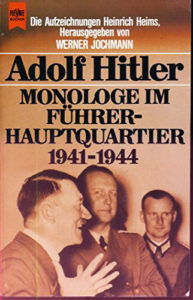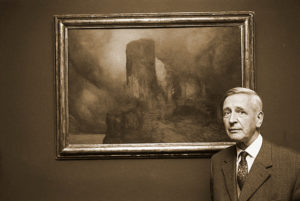It is curious, to say the least, that this extraordinary episode—which, apart from its own ‘resonance’ of truth, is guaranteed by Kubizek’s ignorance of the superhuman realm—has not, to my knowledge, been commented on by any of those who have tried to link National Socialism to ‘occult’ sources. Even the authors who have—quite wrongly!—wanted to attribute to the Führer a nature of ‘medium’ have not, as far as I know, attempted to use it. Instead, they have insisted on the immense power of suggestion which he exercised not only over crowds (and women), but on all those who came, even if only occasionally, into contact with him; on men as coldly detached as a Himmler; on soldiers as realistic as an Otto Skorzeny, a Hans-Ulrich Rudel or a Degrelle.
Now, it is ignorance of the first elements of the science of para-psychic phenomena to consider as ‘medium’ one who enjoys such power. A medium is the one who receives, who undergoes suggestion; not the one who is capable of inflicting it on others, and especially many others. This power is the privilege of the hypnotist or magnetizer, and in this case of a magnetizer of a stature that borders on the superhuman; of a magnetizer capable for his benefit—or rather for the idea, of which he wants to be the promoter—to play the role of a ‘medium’ to the strongest, the stalest, the most resistant to any affecting.
One is not both a magnetiser and a medium. We are one or the other, or neither. And if we want to include some ‘para-psychic’ in the history of Adolf Hitler’s political career—as I believe we are entitled to do—then the magnetizer is him, whose power of exalting and transforming human beings, by the mere spoken word, is comparable to that which Orpheus exerted, it is said, by the enchantment of his lyre, on people and beasts. The ‘medium’ is the German people, almost all of them—and some non-Germans throughout the world, to whom the radio transmitted the bewitching Voice.
The episode mentioned above, of which I have translated Augustus Kubizek’s account, [1] could very well serve as an argument in favour of the presence of ‘medium gifts’ in the young Adolf Hitler if these so-called gifts weren’t contradicted resoundingly, precisely by the astonishing power of suggestion which he didn’t cease to exercise throughout his career on the multitudes and practically all the people. Indeed, Kubizek tells us that he had the distinct impression that ‘another I’ had spoken through his friend; that the stream of prophetic eloquence had seemed to flow from him as from a force alien to him. Now, if the adolescent speaker had nothing of the ‘medium’ about him; if he was in no way possessed by ‘an Other’—god or the devil, whatever; in any case not himself—what then was this ‘other I’ who seemed to take his place during that unforgettable hour on the summit of the Freienberg, under the stars, and to substitute him so completely that the friend would have had some difficulty in recognising him, hadn’t he continued to see him?
Understandably, Auguste Kubizek didn’t ‘dare to pass judgment’ on this. However, he speaks of an ‘ecstatic state’, of ‘complete rapture’ (völlige Entrückung) and the transposition of the visionary’s experience onto ‘another plane, tailored to him’ (auf eine andere, ihm gemässe Ebene). Moreover, this recent living experience—the impression made on him by the story of the 14th-century Roman tribune translated and interpreted by Wagner’s music—had been, the witness tells us, only the ‘external impulse’ which had led him to the vision of the personal as well as the national future; in other words, which had served as the occasion for the adolescent’s access to a new consciousness: a consciousness in which space and time, and the individual state that is linked to these limitations, are transcended.
This would mean that the ‘other plane to the measure’ of the young Adolf Hitler was nothing less than that of the ‘eternal present’ and that, far from having been ‘possessed’ by an alien entity, the future master of the multitudes had become master of the Centre of his being; that he had, under the mysterious influence of his initiator—Wagner—taken the great decisive step on the path of esoteric knowledge, undergone the first irreversible mutation—the opening of the ‘third eye’ which had made him an ‘Edenic man’.
______ 卐 ______

Editor’s Note: Are you finally beginning to understand the metaphor that I have used so many times on this site (the symbol of the three-eyed raven)?
______ 卐 ______
He had just acquired the degree of being corresponding to what is called, in initiatory language, the Little Mysteries. And the ‘other I’ which had spoken through his mouth of things that his daily conscious self was still unaware of, or perhaps only half-perceived ‘as if through a veil’, a few hours before, was his true ‘I’ and that of all the living: the Being, with whom he had just realized his identification.
It may seem strange to the vast majority of my readers—including those who still venerate him as ‘our Führer forever’—that he could, at such an astonishingly young age, have shown such an awakening to supra-sensible realities. Among the men who aspire with all their ardour to essential knowledge, how many are there, in fact, who grow old in meditation and pious exercises without yet reaching this level? But if there is one area where the most fundamental inequality and the most blatant appearance of ‘arbitrariness’ reigns, it is this.
God places his august sign on the forehead of whoever pleases him;
He has forsaken the eagle, and chosen the birdie,
Said the monk. Why did he do this? Who shall tell? Nobody![2]
There is no impossibility for an exceptional adolescent to cross the barrier opened to the mind in search of principled truth, initiation into the Little Mysteries. According to what is still told in India about his life, the great Sankaracharya was one of these. And twenty-two centuries earlier, Akhnaton, king of Egypt, was also sixteen years old when he began to preach the cult of Aten, Essence of the Sun, of which the ‘Disc’ is only the visible symbol. And everything leads us to believe that there were others, less and less rare as we go back for the cycle in which we live the last centuries.
 If, on the other hand, one sees in Adolf Hitler one of the figures—and undoubtedly the penultimate one—of the One who returns when all seems lost; the most recent of the many precursors of the supreme divine incarnation or of the last messenger of the Eternal (the Mahdi of the Mahometans; the Christ returned in glory of the Christians; the Maitreya of the Buddhists; the Saoshyant of the Mazdeans; the Kalki of the Hindus) or by whatever name one wishes to call him, who is to end this cycle and usher in the Golden Age of the next, then all becomes clear.
If, on the other hand, one sees in Adolf Hitler one of the figures—and undoubtedly the penultimate one—of the One who returns when all seems lost; the most recent of the many precursors of the supreme divine incarnation or of the last messenger of the Eternal (the Mahdi of the Mahometans; the Christ returned in glory of the Christians; the Maitreya of the Buddhists; the Saoshyant of the Mazdeans; the Kalki of the Hindus) or by whatever name one wishes to call him, who is to end this cycle and usher in the Golden Age of the next, then all becomes clear.
For then, naturally, he was an adolescent and before that, already an exceptional child: a child whose sign, a word, a nothing (or what might seem ‘a nothing’ to anyone else) was enough to awaken his intellectual intuition. So, it is not impossible to think that, from the school years 1896-97, 1897-98 (and partly 1898-99), which he spent as a pupil at the Benedictine abbey of Lambach-an-Traun, in Upper Austria, the magic of the Holy Swastika—a powerful cosmic symbol, an immemorial evocator of the principal truth—seized him, penetrated him, dominated him; that he had, beyond the exhilarating solemnity of Catholic worship, identified with it forever.
For the Reverend Father Theodorich Hagen, Abbot of Lambach, had, thirty years earlier, this sacred sign engraved on the walls, on the woodwork, in every corner of the monastery, however paradoxical such an action may seem ‘without counterpart in a Christian convent’.[3] And as he sang in the choir the young Adolf, nine years old in 1898, ten years old in 1899, had ‘right in front of him’ on ‘the high back of the abbot’s chair’, in the very centre of Father Hagen’s heraldic shield, the ancient Symbol now destined to remain forever attached to his name.
It is natural, then, that he should have been aware very early on, in parallel with his opening up to the world of Essences, of what had to be done in this visible and tangible world, at the eleventh hour, a ‘recovery’; or even only to suggest one—to sound the last, supreme warning of the Gods, in case the universal decadence was irredeemable (as indeed it seems to be). And, as Kubizek reports, there is every reason to believe that this was the case, since even at the time of his extraordinary awakening the future Führer spoke of the ‘mission’ (Auftrag) he was to receive one day, to lead the people ‘from bondage to the heights of freedom’.[4]
__________
[1] There is a French edition of Auguste Kubizek’s book Adolf Hitler, mein Jugendfreund, published by Gallimard. Unfortunately, the original text has been shortened. The most interesting passages of this story are not included in the translation.
[2] Leconte de Lisle in the poem entitled ‘Hieronymus’, in Poèmes tragiques.
[3] Brissaud : Hitler et l’Ordre Noir, page 23.
[4] Kubizek: Adolf Hitler, mein Jugendfreund, page 140.
![]() For the second time, Lulu has vaporised my account, including all my autobiographical books that have nothing to do with racial or political issues.
For the second time, Lulu has vaporised my account, including all my autobiographical books that have nothing to do with racial or political issues.






